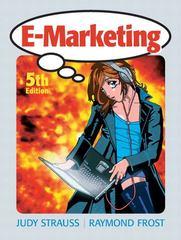Question
Please answer these in the shortest as possible, no more than a paragraph. Both of the links work for copying and pasting 3.7 Discussion: International
Please answer these in the shortest as possible, no more than a paragraph.
Both of the links work for copying and pasting
3.7 Discussion: International Trade
The purpose of this discussion is to analyze the trade-off between efficiency and equality using international trade as an example.
Instructions
1. Milton Friedman, a Nobel Prize winner economist and an advocate of free trade answers questions about the effect of free trade on employment in the following 6-minute video. Please watch the following and reflect on the employment argument for protectionism. Should we protect certain industries against foreign competition through tariffs and quotas to protect employment in these areas? This video is from the 1970s but we have the exact same argument in our current political and economic environment. Please comment on the recently imposed tariffs on many imports mainly from China. Who will win, who will lose as a result of these new tariffs?
https://www.youtube.com/watch?v=j0pl_FXt0eM
2. Traditional trade theories assume that factors of production are freely mobile between industries and geographic regions within the same country. Therefore, workers who are displaced due to foreign competition can switch to other sectors in a different part of the country after a brief transition without any cost. In reality, labor markets tend to be sticky. Workers do not move even when labor market conditions would suggest they should and they are worse off as others who benefit from international trade are better off. International trade increases total surplus and therefore increases efficiency, but it will be at the cost of equality. What is the role of government in helping people who lose as a result of foreign trade? Note: The US government has a program called the Trade Adjustment Assistance Program (TAA) to help workers affected by foreign trade during their adjustment period. However, this program is criticized by Banerjee and Duflo, Nobel prize winners in Economics for not being sufficient. You can find out more about this program and Banerjee and Duflo's arguments here.
https://www.brookings.edu/blog/the-avenue/2019/11/12/displaced-workers-need-more-than-what-economists-are-suggesting/
3. Give an example of one of the consequences of international trade in your communities.Who were the winners, and who were the losers?
Step by Step Solution
There are 3 Steps involved in it
Step: 1

Get Instant Access to Expert-Tailored Solutions
See step-by-step solutions with expert insights and AI powered tools for academic success
Step: 2

Step: 3

Ace Your Homework with AI
Get the answers you need in no time with our AI-driven, step-by-step assistance
Get Started


